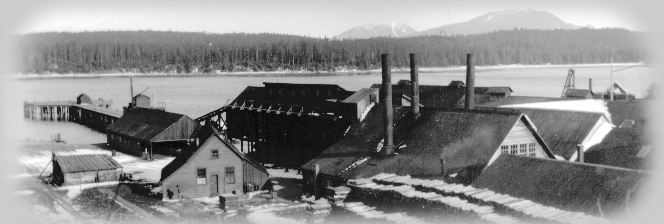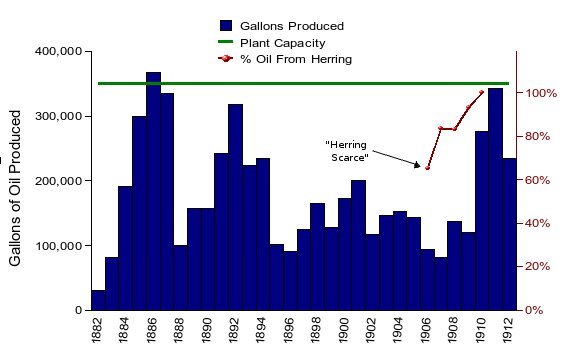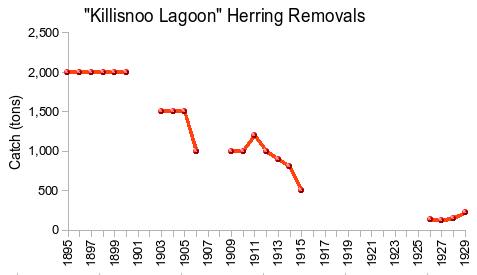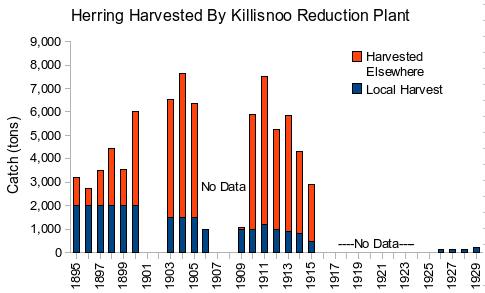Evidence for local depletion around Killisnoo

(Vincent Soboleff collection, PCA 1-339, Alaska State Library--click to enlarge)
----WARNING: "ALPHA" Draft Status This page is still under major development!!
---Text is not intended to be readable---for author's use only!!!!
"I believe that the cod fishery, the herring fishery, the pilchard fishery, the mackerel fishery and probably all the great sea fisheries are inexhaustable; that is to say nothing we can do seriosly affects the number of fish". -- Thomas Huxley (1883), in his opening remarks for the Fisheries Exhibition, London, 1883, later quoted in the New York Times.
Relative Abundance Inferred from Prey Switching

Figure 1. Production of oil at the Killisnoo plant, plant capacity, and the proportion showing the ratio of herring to salmon oil.
When herring were difficult to obtain, the Killisnoo plant would switch to alternative low-value species (chum salmon and possibly dogfish). Cobb and Kutchin (1907) make note that herring were scarce in 1906, and the plant resorted to deriving oil from salmon, making up 35% of its oil production for 1906. The plant operates at well below its capacity for producing oil (Figure 1). For several years after this, Cobb makes notes about the relative proportions of herring and salmon used in making the oil at Killisnoo. The ratio of herring to salmon oil in the records could provide an index of relative abundance, at least as far as the availability of herring to the Killisnoo seiners. The proportion herring increases over the succeeding years, until in 1910 it reaches 100%, and the plant is operating near capacity. This corresponds with one of the periodic peaks in herring catch in the Killisnoo plant records. The other factor affecting production is obviously price received for products; if market conditions could be ascertained and removed as a factor, the amount of the catch and oil production below plant capacity could provide a good index of relative abundance for the Chatham Strait area. Thus far no good long-term source of herring oil markets has been located for this period.

Figure __. Removals from the Killisnoo Lagoon by the herring reduction plant at Killisnoo, 1885-1929.
xxxxx

Figure __. Removals from the Killisnoo Lagoon relative to other removals.
yyyyy
Other
From the end of August into January the waters of Chatham Strait are black with herring. The Indians used to catch them with primitive rakes, made by driving nails through the end of a piece of board, and with this rude implement they could quickly fill a canoe with herring, each nail catching two and three fish. Seines have supplanted the aborigine's hand rake, and a thousand barrels of silver herring have been taken at a single haul, although the average haul is about half as many barrels, and requiring eleven men to each net then. Each barrel of fish yields about three gallons of oil at the oil works which are managed by men who have had charge of menhaden fisheries on the Atlantic coast As Alaska, Its Southern Coast and the Sitkan Archipelago By Eliza Ruhamah ScidmoreRounsefell (1935) "On the other hand, the failure of the once importnt fishery in Kootzhnahoo Inlet, on Admiralty Island, may be fairly ascribed to depletion of the stocks from overfishing"
Back to: History of Southeast Alaska Herring Fisheries
Link to: References
Caution: These pages contain preliminary research results, and are presented here only to further collaborative research and analysis. The information presented has not been fully analyzed or verified for correctness. Please consult the original literature citations for authentic interpretations or contact the author regarding applications of any analysis presented on these pages.
For more information, contact Fritz Funk:
fritz funk.io
| Last modified: Apr 12, 2008 at 21:14:42
funk.io
| Last modified: Apr 12, 2008 at 21:14:42

